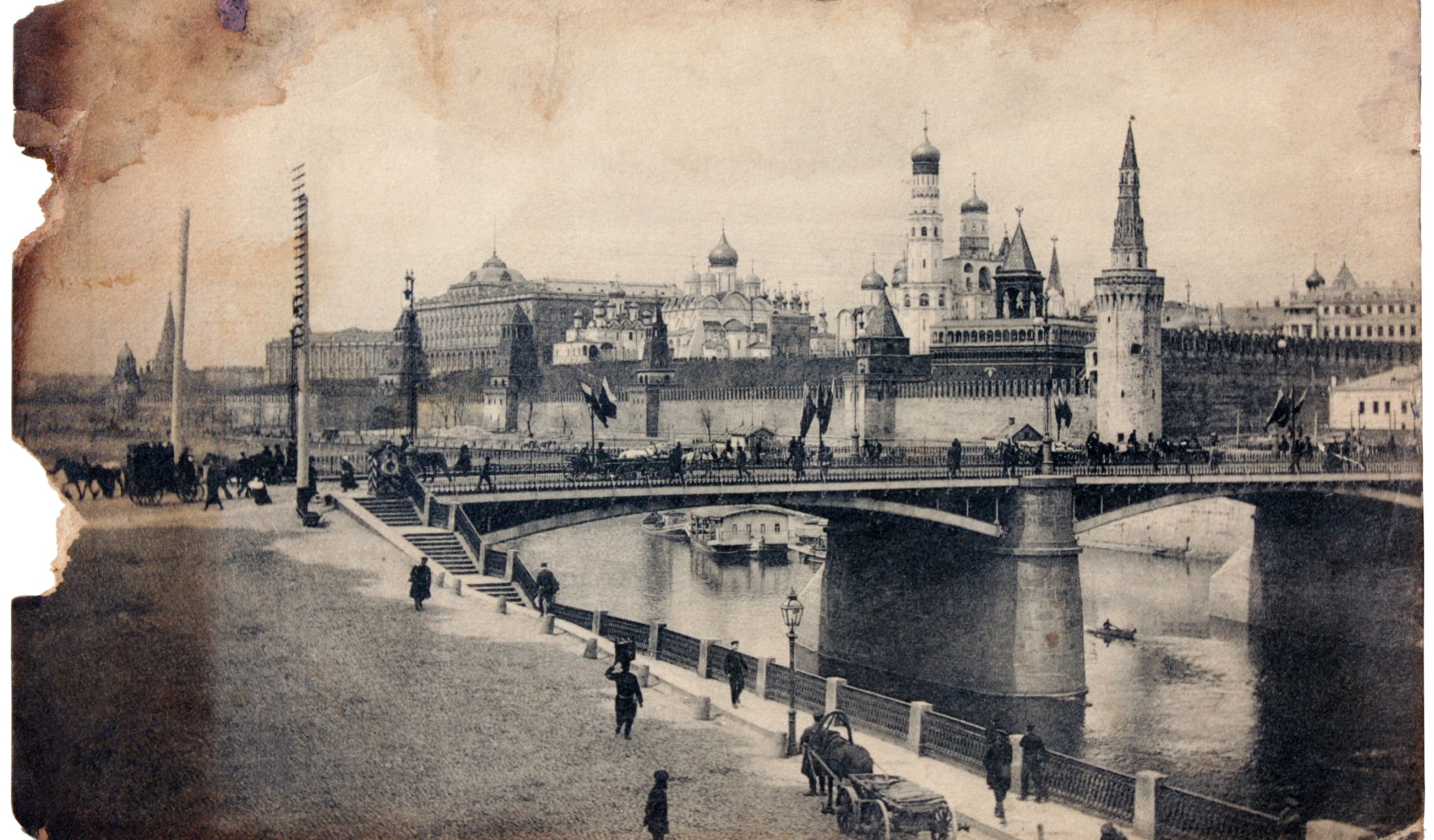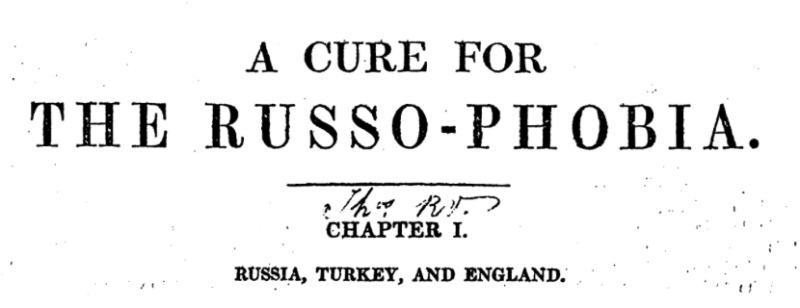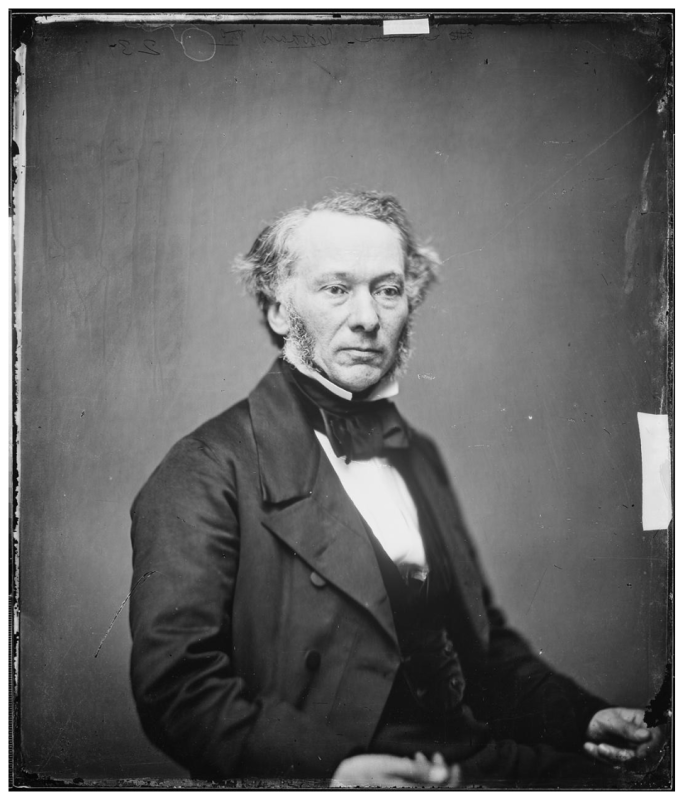
Russia and America each seem “called by a secret design of Providence to hold the destinies of half the world one day.”
The words are from 1835. They come at the end of the first volume of Democracy in America by Alexis de Tocqueville. The Frenchman seemed to have his finger on the pulse of the cosmos.
Today in the United States and the United Kingdom, there is an official and extremist public attitude of Russia hate. Few may know how far back it goes.
Here I share quotations from just one year later; that is, from 1836. You decide whether the quotations seem apt as criticism of today’s Russia hate.
There appeared in 1836 in Britain a guidepost in this Anglo tradition. It is a pamphlet by Richard Cobden. The top of the first page of text showed the title “A Cure for the Russo-Phobia.”
Cobden (1804–1865) personified 19th-century British liberalism, in his writings, speeches, organizing, and serving in Parliament for 24 years. His time was one of Russia hate. He did not partake in it. Rather, he argued that “the prejudices existing in the minds of the British people against that Power…are founded in delusion and misrepresentation.”
Cobden concludes, “We do not know…one solitary ground upon which to found a pretence, consistent with reason, common sense, or justice, for going to war with Russia.”
More about the 1836 pamphlet and an abridgement is available online. The following excerpts help us see how perennial has been the Russia hate by governmental elites in the Anglosphere:
“Lord Dudley Stuart [gives] an alarming picture given of the future growth of Russian dominion. Turkey, it seems, is to be only the germ of an empire which shall extend…over Europe and Asia, and embrace every people and nation between the Bay of Bengal and the English Channel!”
“Austria and all Italy are to be swallowed up at a meal, Greece and the Ionian Islands serving for side-dishes. Spain and Portugal follow as a dessert for this Dando of Constantinople; and Louis Philippe and his empire are washed down afterwards with Bordeaux and Champagne.”
“They who predict the unbounded extension of Russia, forget the inevitable growth of weakness which attends the undue expansion of territorial dominion… [They are] blind to the dangers which must attend the attempt to incorporate into one cumbrous empire these remote and heterogeneous nations.”
“The Russians are accused by us of being…incessantly addicted to picking and stealing. But, in the meantime, has England been idle? If, during the last century Russia has plundered Sweden, Poland, Turkey, and Persia, until she has grown unwieldy with the extent of her spoils, Great Britain has, in the same period, robbed—no, that would be an unpolite phrase—’has enlarged the bounds of his Majesty’s dominions’ at the expense of France, Holland, and Spain.”
“[W]e, who are staggering under the embarrassing weight of our colonies, with one foot upon the rock of Gibraltar and the other at the Cape of Good Hope—with Canada, Australia, and the peninsula of India…we are not exactly the nation to preach homilies to other people in favour of the national observance of the eighth commandment!”
“Nor, if we were to enter upon a comparison of the cases, should we find that the means whereby Great Britain has augmented her possessions, are a whit less reprehensible than those which have been resorted to by [Russia] for a similar purpose.”
“If the English writer calls down indignation upon the conquerors of the Ukraine, Finland, and the Crimea, may not Russian historians conjure up equally painful reminiscences upon the subjects of Gibraltar, the Cape, and Hindostan?”
“[D]uring the last hundred years, England has, for every square league of territory annexed to Russia, by force, violence, or fraud, appropriated to herself three.”
“Our history during the last century may be called the tragedy of ‘British intervention in the politics of Europe;’ in which princes, diplomatists, peers, and generals, have been the authors and actors-the people the victims; and the moral will be exhibited to the latest posterity in 800 millions of debt.”
“[W]e are no more called upon [to deal vengeance] upon [Russia], than we are to preserve the peace and good behaviour of Mexico, or to chastise the wickedness of the Ashantees.”
“[N]on-intervention in the political affairs of other nations…from the moment this maxim becomes the load-star by which our government shall steer the vessel of the state—from that moment the good old ship Britannia will float triumphantly in smooth and deep water, and the rocks, shoals, and hurricanes of foreign war are escaped for ever.”
“[George] Washington…bequeathed, as a legacy to his fellow-citizens, the injunction, that they should never be tempted by any inducements or provocations to become parties to the States’ system of Europe.”
Disclaimer
Some of the posts we share are controversial and we do not necessarily agree with them in the whole extend. Sometimes we agree with the content or part of it but we do not agree with the narration or language. Nevertheless we find them somehow interesting, valuable and/or informative or we share them, because we strongly believe in freedom of speech, free press and journalism. We strongly encourage you to have a critical approach to all the content, do your own research and analysis to build your own opinion.
We would be glad to have your feedback.
Source: Brownstone Institute Read the original article here: https://brownstone.org/




